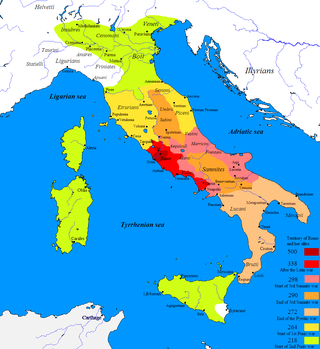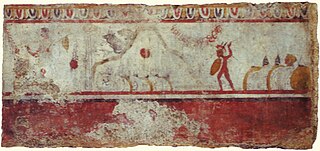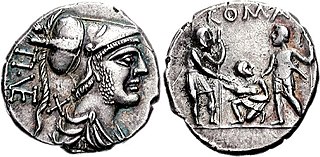Related Research Articles
During the 290s BC, Hellenistic civilization begins its emergence throughout the successor states of the former Argead Macedonian Empire of Alexander the Great, resulting in the diffusion of Greek culture throughout the Levant and advances in science, mathematics, philosophy, etc. Meanwhile, the Roman Republic is embroiled in war against the Samnites, the Mauryan Empire continues to thrive in Ancient India, and the Kingdom of Qin in Ancient China, the one which in the future will conquer its adversaries and unite China, begins to emerge as a significant power during the Warring States period.
Year 321 BC was a year of the pre-Julian Roman calendar. At the time, it was known as the Year of the Consulship of Calvinus and Caudinus. The denomination 321 BC for this year has been used since the early medieval period, when the Anno Domini calendar era became the prevalent method in Europe for naming years.

The First, Second, and Third Samnite Wars were fought between the Roman Republic and the Samnites, who lived on a stretch of the Apennine Mountains south of Rome and north of the Lucanian tribe.
The gens Pontia was a plebeian family at ancient Rome. Few members of this gens rose to prominence in the time of the Republic, but the Pontii flourished under the Empire, eventually attaining the consulship. Pontius Pilatus, as prefect of Judaea, is known for his role in the execution of Jesus.
Titus Larcius was a Roman general and statesman during the early Republic, who served twice as consul and became the first Roman dictator.

The Battle of Caudine Forks, 321 BC, was a decisive event of the Second Samnite War. Its designation as a battle is a mere historical formality: there was no fighting and there were no casualties. The Romans were trapped in an enclosed valley by the Samnites before they knew what was happening and nothing remained but to negotiate an unfavorable surrender. The action was entirely political, with the magistrates on both sides trying to obtain the best terms for their side without disrespecting common beliefs concerning the rules of war and the conduct of peace. In the end the Samnites decided it would be better for future relations to let the Romans go, while the Romans were impeded in the prosecution of their campaign against the Samnites by considerations of religion and honor.

Lucius Papirius Cursor was a celebrated politician and general of the early Roman Republic, who was five times consul, three times magister equitum, and twice dictator. He was the most important Roman commander during the Second Samnite War, during which he received three triumphs.
Gaius Pontius, sometimes called Gavius Pontius, was a Samnite commander during the Second Samnite War. He is most well known for his victory over the Roman legions at the Battle of the Caudine Forks in 321 BC. He was eventually captured and executed by Fabius Rullianus.
Aulus Postumius Albinus was a Roman senator and military commander. In 110 BC, he went to serve on the staff of his brother, Spurius, in the war against the Numidian king Jugurtha. Left in charge of the troops during the winter, Aulus decided on a rash foray which involved the army in a humiliating defeat and surrender. The disaster led to the establishment of a commission which condemned several prominent aristocrats of collusion with the enemy during the war. Aulus himself was seemingly not condemned, and went on to be elected consul a decade later, in 99 BC. In 89, Aulus held command of a fleet during the Social War in Italy, but proved to be an unpopular commander and was murdered by his troops.
Titus Veturius Calvinus was a Roman statesman, who held the consulship in 334 and 321 BC, the latter year during the Second Samnite War.

The gens Postumia was a noble patrician family at ancient Rome. Throughout the history of the Republic, the Postumii frequently occupied the chief magistracies of the Roman state, beginning with Publius Postumius Tubertus, consul in 505 BC, the fifth year of the Republic. Although like much of the old Roman aristocracy, the Postumii faded for a time into obscurity under the Empire, individuals bearing the name of Postumius again filled a number of important offices from the second century AD to the end of the Western Empire.
The gens Carvilia was a plebeian family at ancient Rome, which first distinguished itself during the Samnite Wars. The first member of this gens to achieve the consulship was Spurius Carvilius Maximus, in 293 BC.
The gens Atinia was a minor plebeian family at Ancient Rome, which came to prominence during the late Republic. No members of this gens ever attained the consulship, although several were praetors in the early second century BC, beginning with Gaius Atinius Labeo 195.

The gens Veturia, originally Vetusia, was an ancient patrician family of the Roman Republic. According to tradition, the armourer Mamurius Veturius lived in the time of Numa Pompilius, and made the sacred ancilia. The Veturii occur regularly in the Fasti Consulares of the early Republic, with Gaius Veturius Geminus Cicurinus holding the consulship in 499 BC. Like other old patrician gentes, the Veturii also developed plebeian branches. The family declined in the later Republic, with the last consular Veturius holding office in 206 BC, during the Second Punic War.
Lucius Furius Medullinus, of the patrician gens Furia, was a politician and general of the Roman Republic who was consul twice and Consular Tribune seven times.
The Roman-Aequian wars were a series of wars during the early expansion of ancient Rome in central Italy against their eastern neighbours, the Aequi.
The gens Maelia was a plebeian family at ancient Rome. Members of this gens are mentioned in the time of the early Republic, from just after the decemvirs down to the Samnite Wars. The Maelii belonged to the equestrian order, and were among the wealthiest of the plebeians. The most famous of the Maelii was probably Spurius Maelius, a wealthy merchant who purchased grain from the Etruscans during a famine in 440 BC, and sold it to the poor at a nominal price. The following year, the patricians accused him of conspiring to make himself king, and when he resisted arrest he was slain by the magister equitum, Gaius Servilius Ahala.
The gens Nautia was an old patrician family at ancient Rome. The first of the gens to obtain the consulship was Spurius Nautius Rutilus in 488 BC, and from then until the Samnite Wars the Nautii regularly filled the highest offices of the Roman Republic. After that time, the Nautii all but disappear from the record, appearing only in a handful of inscriptions, mostly from Rome and Latium. A few Nautii occur in imperial times, including a number who appear to have been freedmen, and in the provinces.
Aulus Cornelius Cossus Arvina was a Roman politician and general who served as both consul and Magister Equitum twice, and Dictator once in the mid 4th century BC.
Gaius Sulpicius Longus was an accomplished general and statesman of the Roman Republic who served as Consul thrice and dictator once during his career, triumphing once over the Samnites and achieving great political success.
References
- ↑ Broughton Magistrates of the Roman Republic pp. 140, 142, 150, 151
- ↑ Smith, William (1867), "Spurius Postumius Albinus (9)", in Smith, William (ed.), Dictionary of Greek and Roman Biography and Mythology , vol. 1, Boston: Little, Brown and Company, p. 91
- ↑ Livy, viii. 16, 17
- ↑ Livy, viii. 17, 23
- ↑ Livy, ix. 1—10
- ↑ Appian, de Reb. Samn. 2—6
- ↑ Cicero, De Officiis iii. 30, Cato Maior de Senectute 12